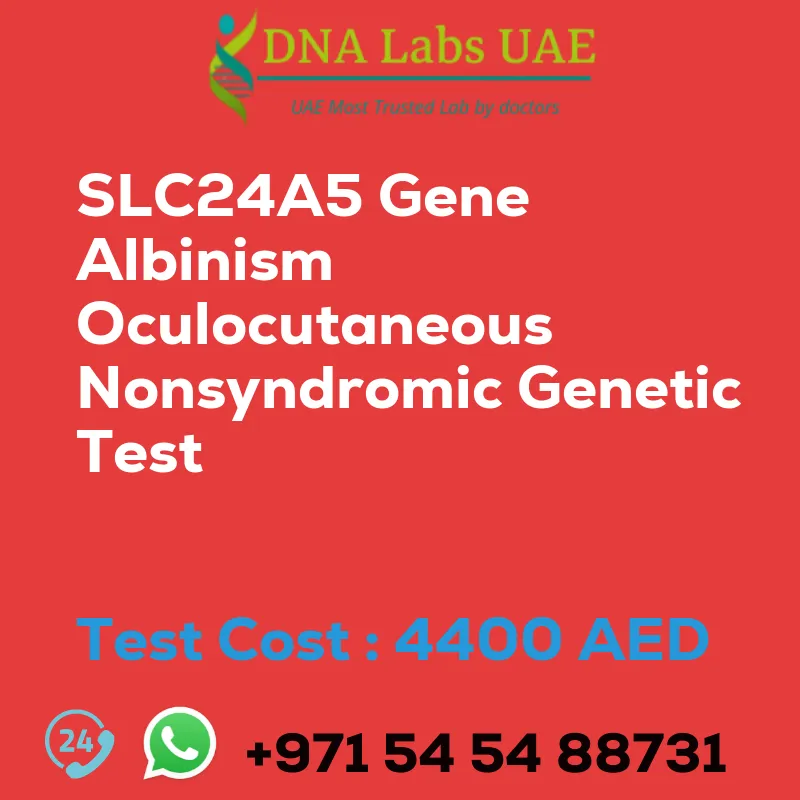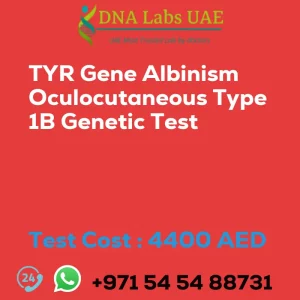SLC24A5 Gene Albinism oculocutaneous nonsyndromic Genetic Test
Components:
- Test Name: SLC24A5 Gene Albinism oculocutaneous nonsyndromic Genetic Test
- Price: 4400.0 AED
- Sample Condition: Blood or Extracted DNA or One drop Blood on FTA Card
- Report Delivery: 3 to 4 Weeks
- Method: NGS Technology
- Test type: Osteology Dermatology Immunology Disorders
- Doctor: Dermatologist
- Test Department: Genetics
Pre Test Information:
Clinical History of Patient who is going for SLC24A5 Gene Albinism, oculocutaneous nonsyndromic NGS Genetic DNA Test. A Genetic Counselling session to draw a pedigree chart of family members affected with SLC24A5 Gene Albinism, oculocutaneous nonsyndromic NGS Genetic DNA Test gene SLC24A5.
Test Details:
The SLC24A5 gene is a gene that codes for a protein involved in the transport of calcium ions across cell membranes. Mutations in this gene have been associated with a form of albinism called oculocutaneous albinism type 2 (OCA2). Oculocutaneous albinism is a genetic condition characterized by a reduction or absence of melanin pigment in the skin, hair, and eyes. People with OCA2 typically have very light skin, hair, and eye color, and they often have vision problems such as reduced visual acuity, nystagmus (involuntary eye movements), and increased sensitivity to light.
NGS (Next-Generation Sequencing) genetic testing is a method used to analyze multiple genes simultaneously and identify mutations or variations in the DNA sequence. In the case of albinism, NGS genetic testing can be used to detect mutations in the SLC24A5 gene, among others, to confirm a diagnosis of oculocutaneous albinism. The NGS genetic test for oculocutaneous albinism would involve obtaining a sample of DNA, typically through a blood or saliva sample, and sequencing the DNA to identify any mutations or variations in the SLC24A5 gene.
This test can provide valuable information for individuals and their families regarding the genetic cause of albinism and can help guide appropriate medical management and genetic counseling. It is important to note that genetic testing for albinism should be conducted by a qualified healthcare professional, such as a geneticist or genetic counselor, who can interpret the results and provide appropriate counseling and support.
| Test Name | SLC24A5 Gene Albinism oculocutaneous nonsyndromic Genetic Test |
|---|---|
| Components | |
| Price | 4400.0 AED |
| Sample Condition | Blood or Extracted DNA or One drop Blood on FTA Card |
| Report Delivery | 3 to 4 Weeks |
| Method | NGS Technology |
| Test type | Osteology Dermatology Immunology Disorders |
| Doctor | Dermatologist |
| Test Department: | Genetics |
| Pre Test Information | Clinical History of Patient who is going for SLC24A5 Gene Albinism, oculocutaneous nonsyndromic NGS Genetic DNA Test. A Genetic Counselling session to draw a pedigree chart of family members affected with SLC24A5 Gene Albinism, oculocutaneous nonsyndromic NGS Genetic DNA Test gene SLC24A5 |
| Test Details |
The SLC24A5 gene is a gene that codes for a protein involved in the transport of calcium ions across cell membranes. Mutations in this gene have been associated with a form of albinism called oculocutaneous albinism type 2 (OCA2). Oculocutaneous albinism is a genetic condition characterized by a reduction or absence of melanin pigment in the skin, hair, and eyes. People with OCA2 typically have very light skin, hair, and eye color, and they often have vision problems such as reduced visual acuity, nystagmus (involuntary eye movements), and increased sensitivity to light. NGS (Next-Generation Sequencing) genetic testing is a method used to analyze multiple genes simultaneously and identify mutations or variations in the DNA sequence. In the case of albinism, NGS genetic testing can be used to detect mutations in the SLC24A5 gene, among others, to confirm a diagnosis of oculocutaneous albinism. The NGS genetic test for oculocutaneous albinism would involve obtaining a sample of DNA, typically through a blood or saliva sample, and sequencing the DNA to identify any mutations or variations in the SLC24A5 gene. This test can provide valuable information for individuals and their families regarding the genetic cause of albinism and can help guide appropriate medical management and genetic counseling. It is important to note that genetic testing for albinism should be conducted by a qualified healthcare professional, such as a geneticist or genetic counselor, who can interpret the results and provide appropriate counseling and support. |







